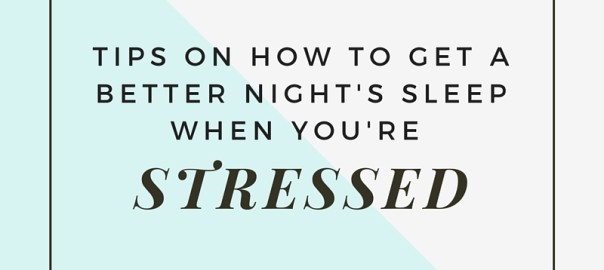Everyone at some point or another knows the frustration of lying awake in bed with a busy mind ticking away. Whether it be an amazing idea, something you’ve forgotten to do, or a twinge of worry – these little niggles can keep you from drifting off no matter how relaxed or tired you feel. Adding stress to that equation will only make things worse and before you know it you’ll be staring at the clock at 3am wondering how many hours of sleep you can potentially get before the new day. A bad night’s sleep leads to even more stress, which can potentially lead to an even worse night sleep, so all in all it’s pretty important to break the cycle and fix the problem. Try some of these tips tonight for a night of sweet dreams.
Set a bed time. One of the best ways of making sure that you have yourself a good night’s sleep is to get into a routine. Statistics show that our bodies are built for a sleep pattern of 10pm – 6am however, it’s not always that simple, so set a realistic bedtime that will suit your lifestyle. It is a well-known fact that 9 hours is the recommended amount of sleep, so use your morning routine to figure out your evening – but make sure you leave yourself a good 15 minutes to fall asleep.
Choose your snacks wisely. For some reason most people believe that snacking before bed is a no-no, however, a light snack before bed can in some cases help you to sleep. Foods such as turkey sandwiches, whole-grain cereal, granola and bananas have been proven to calm the brain.
No electronics. We know how tempting it is to check your email or Twitter just one last time before you shut your eyes for the night, but the blue light from screens disrupts your brains ability to feel sleepy. Avoiding bright screens within 2 hours of your bedtime isn’t necessarily ideal but if you’re in desperate need of those Z’s and are sick of counting sheep, it may be the way forward.
Caffeine is not your friend. Busy schedules love coffee, it’s just the way it is, but caffeine can stay in your system for up to 14 hours after consumption. If you seem to be having trouble sleeping try and remove caffeine from your diet for a few weeks replacing it with water or herbal tea and see if you can spot any improvements.
Break a sweat. It has been reported that regular exercise can help you to sleep better and feel more energised throughout the day. It doesn’t need to be a high intensity work out, low-impact exercises such as yoga or walking can speed up your metabolism leading to improved sleep quality.
Have a soak. Having a bath before bed can really help to reduce stress levels and relax the body. A hot/warm bath with lavender extracts for around 20 minutes is a great idea – adjusting your body’s temperature to a point that signals your brain that “It’s time to snooze!”.
Stay asleep. If your waking up during the night the likelihood is – something is catching your attention whilst you’re in the lighter part of your sleep cycle. Try cutting down on your liquid intake before bed to prevent you from needing to use the bathroom mid-sleep, or invest in some dark curtains to block out any natural light entering your room.
We hope this helps and you’re full of beans in the morning!
